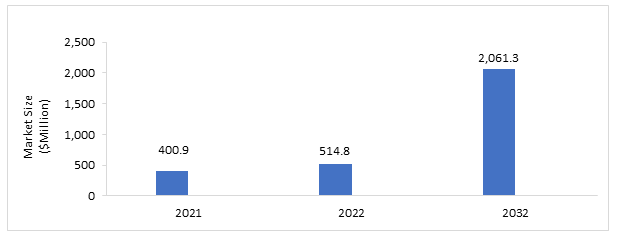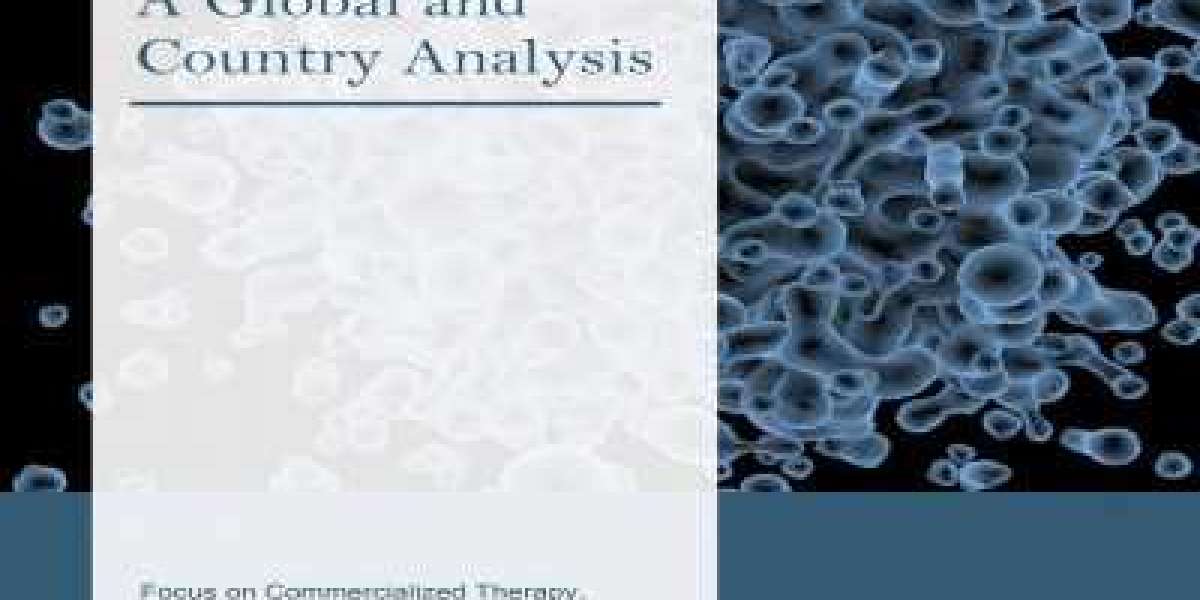The FLT3 gene gives instructions for making a protein known as fms-like tyrosine kinase 3 (FLT3). FLT3 is recognized as a part of a family of proteins called receptor tyrosine kinases (RTKs) which transmit signals from the cell surface into the cell through a process known as signal transduction. This signaling mechanism tends to control many crucial cellular processes, including cell proliferation and survival, specifically of early blood cells called hematopoietic progenitor cells. Any changes in the FLT3 gene result in the form of blood cancer, predominantly FLT3 mutated acute myeloid leukemia (AML).
The global FLT3 inhibitors market is expected to reach $2,061.3 million in 2032 from $400.9 million in 2021 at a CAGR of 14.88% during the forecast period 2022-2032. The global FLT3 inhibitors market growth is expected to be driven by the introduction of novel products, the increasing incidence of acute myeloid leukemia, and the rising research and development investments, among others.

Recent Developments in the Global FLT3 Inhibitors Market
• In March 2021, Astellas Pharma's Xospata (Gilteritinib) met the overall survival endpoint in the COMMODORE trial of subjects having FLT3 mutated relapsed or refractory acute myeloid leukemia.
• In December 2021, Allarity Therapeutics submitted a New Drug Application (NDA) to the U.S. FDA for Dovitinib as a third-line treatment for renal cell carcinoma (RCC).
• In June 2021, Cullinan Oncology received Investigational New Drug (IND) Clearance from the FDA for CLN-049 to treat relapsed/refractory AML.
• In June 2019, Daiichi Sankyo Company, Limited received a Complete Response Letter (CRL) from the U.S. FDA for the New Drug Application (NDA) of Vanflyta (Quizartinib) to treat adult patients with relapsed/ refractory FLT3-ITD acute myeloid leukemia.
Market Segmentation
Segmentation 1: by Commercialized Therapies
• Type 1 FLT3 Inhibitors
• Type 2 FLT3 Inhibitors
The Type 1 FLT3 inhibitors segment represented the largest market share at 96.63% of total commercialized therapies in 2021. However, the Type 2 FLT3 inhibitors segment is anticipated to register a high growing CAGR of 14.63% during the forecast period 2022-2032.
Segmentation 2: by Potential Pipeline Products
• Crenolanib
• Dovitinib
• SKLB1028
The Dovitinib is expected to hold 59.56% of total potential pipeline products in 2032, while Crenolanib and SKLB1028 segment is expected to hold 33.71% and 6.73% in 2032, respectively.
Segmentation 3: by Region
• North America - U.S., Canada
• Europe - Germany, Italy, France, U.K., Spain, Rest-of-Europe
• Asia-Pacific - China, Japan, Rest-of-APAC (RoAPAC)
• Rest-of-the-World (RoW)
The North America FLT3 inhibitors market was valued at $252.7 million in 2021, and the region is currently the leading contributor to the market. The growth can be attributed to the increased research and development activities in the region.
Demand – Drivers and Limitations
Following are the demand drivers for the global FLT3 inhibitors market:
• Introduction of Novel Products
• Increasing Incidence of Acute Myeloid Leukemia
• Rising Research and Development Investments
The market is expected to face some limitations too due to the following challenges:
• High Treatment Cost Impacting the Adoption Rate
• Disease Relapse in FLT3 Mutated AML
Key Market Players and Competition Synopsis
The companies that are profiled have been selected based on inputs gathered from primary experts and analyzing company coverage, product portfolio, and market penetration.
Some prominent names established in this market are:
• Cullinan Oncology, LLC
• Astellas Pharma Inc.
• Allarity Therapeutics, Inc.
• AROG Pharmaceuticals, Inc.
• Aptose Biosciences Inc.
• Novartis International AG
• Daiichi Sankyo Company, Limited
• CSPC ZhongQi Pharmaceutical Technology Co., Ltd.
• FUJIFILM Pharmaceuticals U.S.A., Inc.
• Jiangsu HengRui Medicine Co., Ltd.
Key Questions Answered in This Report
▪ What are the major market drivers, challenges, and opportunities in the global FLT3 inhibitors market?
▪ What are the underlying structures resulting in the emerging trends within the global FLT3 inhibitors market?
▪ What are the key development strategies that are being implemented by the major players to sustain themselves in the competitive market?
▪ What is the pricing and reimbursement scenario in the field of FLT3 inhibitors?
▪ What are the potential emerging therapies present in the pipeline for FLT3 inhibitors?
▪ What are the key regulatory implications in major geographies pertaining to FLT3 inhibitors?
▪ What are the potential entry barriers which are expected to be faced by the companies willing to enter a particular country?
▪ How is each segment of the market expected to grow during the forecast period 2022-2032, and what is the anticipated revenue to be generated by each of the segments?
Following are the segments:
▪ Commercialized Therapies (Type 1 FLT3 Inhibitors and Type 2 FLT3 Inhibitors)
▪ Potential Pipeline Products (Crenolanib, Dovitinib, and SKLB1028)
▪ Region (North America, Europe, Asia-Pacific, and Rest-of-the-World)
▪ What are the growth opportunities for the companies in the region of their operation?
▪ Who are the leading players with significant offerings in the global FLT3 inhibitors market?
▪ Which companies are expected to be highly disruptive in the future, and why?
The USP of this report
The following can be seen as some of the USPs of the report:
• Extensive competitive benchmarking of the top 12 players to offer a holistic view of the global FLT3 inhibitors market landscape
• Market ranking analysis based on product portfolio, recent developments, and regional analysis
Who should buy this report?
Pharmaceutical or biopharmaceutical companies are involved in developing novel therapeutic drugs to treat blood cancers with FLT3 positive mutations.
BIS Related Studies
Hematological Malignancies Emerging Therapeutics Market - A Global and Regional Analysis









